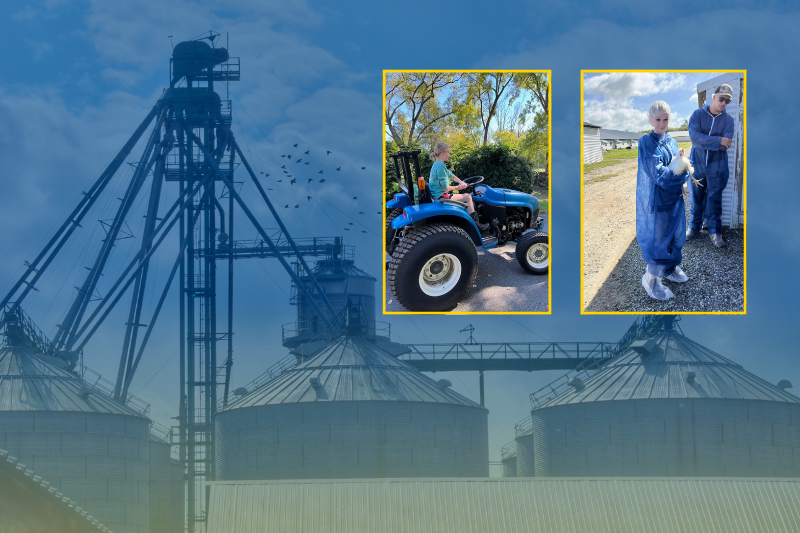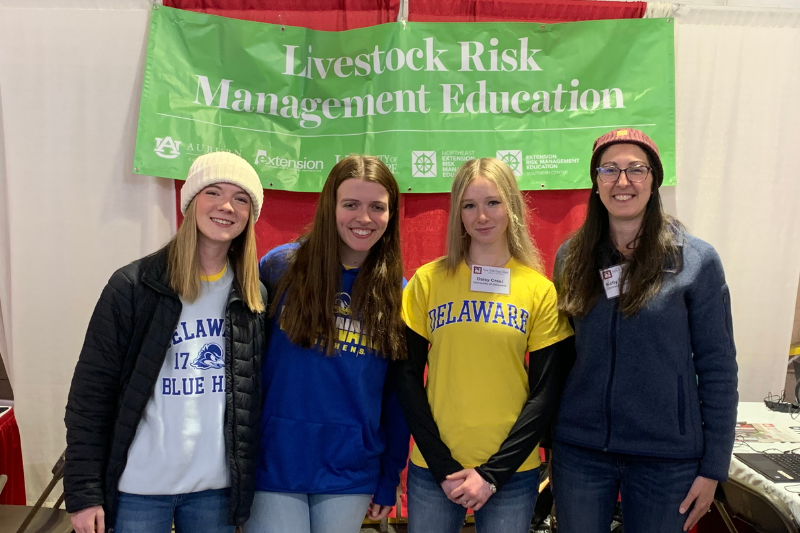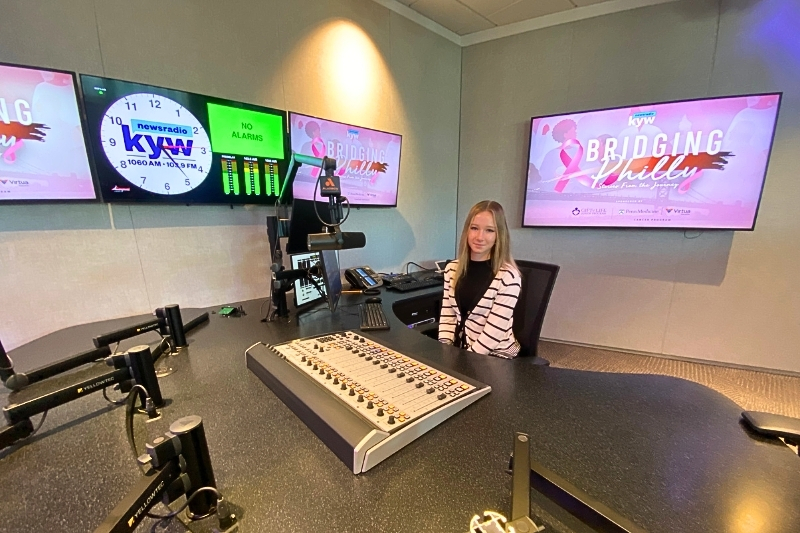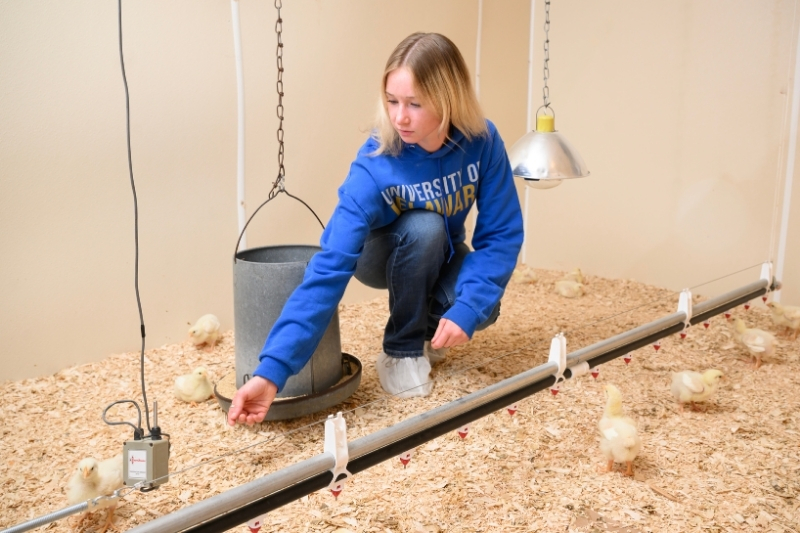


Interdisciplinary agricultural education
Photos by Kathy F. Atkinson and courtesy of Daisy Creel November 12, 2025
Agriculture and natural resources major Daisy Creel immerses herself in animal and food science, agribusiness and policy
Growing up on a family farm and involved with local 4-H, Daisy Creel knew she yearned for a career in agriculture but was not sure in which sector. So when she came to the University of Delaware, she was quick to get involved.
Creel, a senior agriculture and natural resources major, did not stick to the typical agricultural route. Instead, she held multiple farm and policy internships, experiences in food marketing and agribusiness and a diverse courseload, positioning herself for a bright future in farm management.
Sustainably farming
Creel interned with UD Fresh to You on UD’s Newark Farm in 2023, where she learned to grow and care for organic produce as well as how to market and sell them to the public.
“That is a community supported agriculture (CSA) program, which helps increase accessibility to food for students and employees at the University,” Creel said. “I learned everything about taking care of a variety of vegetables and then selling them, so it was an agricultural program, but also kind of a business internship as well.”
This sparked Creel’s interest in food systems and sustainability in agriculture. She contributed to landscape architecture associate professor Anna Wik’s Edible Forest Garden l project on the UD Children’s Campus.

“It was a really collaborative experience,” Creel said. “I did a lot of planting and deciding on plants from an agricultural perspective, but the landscape architecture interns decided on placement based on where the plants would look and grow the best.”
Interns on Wik’s project had access to a variety of plants and equipment from the UD farm as well as mentorship from faculty across the college.
“I would take what I’ve learned from that project to implement on my own farm,” Creel said. “We had spreadsheets organizing all the plants, what conditions they grow best in and where they grow. We had to meticulously plan and think years in the future.”
Shaping agricultural policy
With more farm experience under her belt, Creel decided to step into Applied Economics and Statistics (APEC) to learn more about the business side of agriculture.
Creel interned in Winter 2025 with Kelly Davidson, assistant professor of applied economics, looking into how farmers assess risk and spread information about a new crop insurance program from the United States Department of Agriculture (USDA).
“We surveyed farmers at a few farm shows about what was important to them on their farms and what they felt could be improved,” Creel said. “I also worked on another project asking farmers whether or not they’d be interested in adopting a different soil nitrogen management system.”
Interning with Davidson’s USDA project helped Creel not only boost her sales and marketing skills, but also showed her how to navigate difficult conversations with farmers, researchers and clients.

“Daisy also took my international trade class where we look into policy and trading dynamics,” Davidson said. “Understanding all of that plays into being a good decision-maker in an agricultural setting and really makes Daisy a cutting-edge person in the industry.”
This summer, Creel interned with the National Watermelon Association to brush up on the government and regulatory side of agriculture.
“Produce growers tend to come last in terms of where the priority goes in agriculture,” Creel said. “Usually the chain of importance goes from the meat industry, any sort of the animal product other than meat, the grain industry and then produce. But watermelon is also considered a specialty crop, so it’s usually not high up within the produce category.”
Through her internship with the National Watermelon Association, Creel helped ensure that watermelon growers are represented by informing them about lobbyists or lawyers that the association hired to relay their needs to policymakers.
Interdisciplinary mindset in the classroom
Creel carries her interest in exploring all things agriculture as she builds her class schedule, allowing her to see the full picture of how everything happens from farm to table.
Take Dairy Production (ANFS 404) and Economics of Biotechnology and New Technologies (APEC 316), two of Creel’s favorite classes, as examples. Dairy Production teaches students the nutrition, genetics and diseases of cattle and how they relate to raising them for dairy production. Alternatively, Economics of Biotechnology and New Technologies is more focused on issues like consumer marketing, food labeling and risk assessment for new technologies.
Although vastly different, Creel feels that a variety of classroom experience gives her the ability to look at agricultural problems with a more informed perspective.
“I’ve really been able to take my major and customize it to fit my interests,” Creel said. “A lot of my classes are based on my minors, but I started out taking the basic agriculture classes and was able to expand into food and animal science, economics and agribusiness.”
Creel’s triple minors in food and agribusiness marketing and management, food science and animal science have allowed her to shape her own learning along with her various internships and experiences outside of the classroom.

Eventually, Creel hopes to take her multidisciplinary mind into farm management.
“I could see myself working for a bigger company, but I also like the idea of just working on a small farm,” Creel said. “Agriculture is interdisciplinary in itself, so I feel like I am getting the experience I need by getting exposure in all these very different, but very important disciplines surrounding agriculture.”
According to Davidson, being able to understand multiple sectors of agriculture is a lot of what being in farm management entails.
“Daisy is really intentional about gaining skills that are going to serve her in a farm management position and is really one of the most hardworking students I’ve ever met,” Davidson said. “Farm management in a nutshell is being able to understand policy, physical economics, how to engage with customers, science and agronomics, so she is shaping up to be a great modern-day farmer.”
Contact Us
Have a UDaily story idea?
Contact us at ocm@udel.edu
Members of the press
Contact us at mediarelations@udel.edu or visit the Media Relations website

